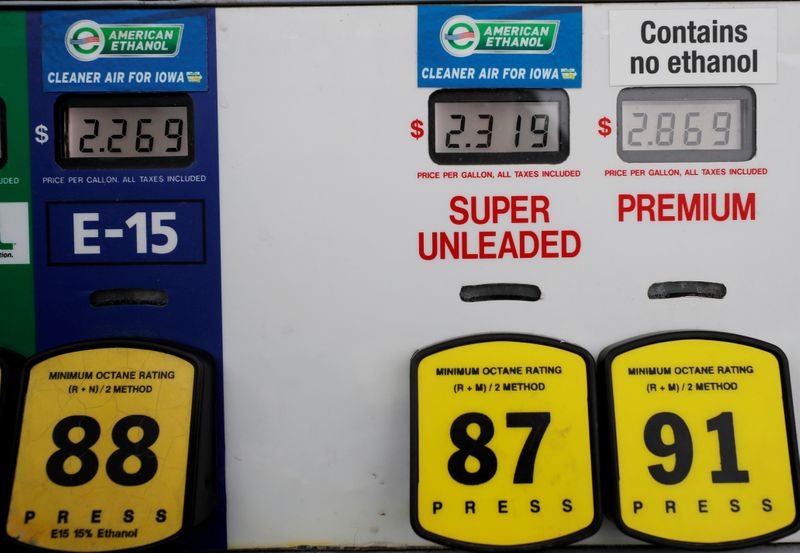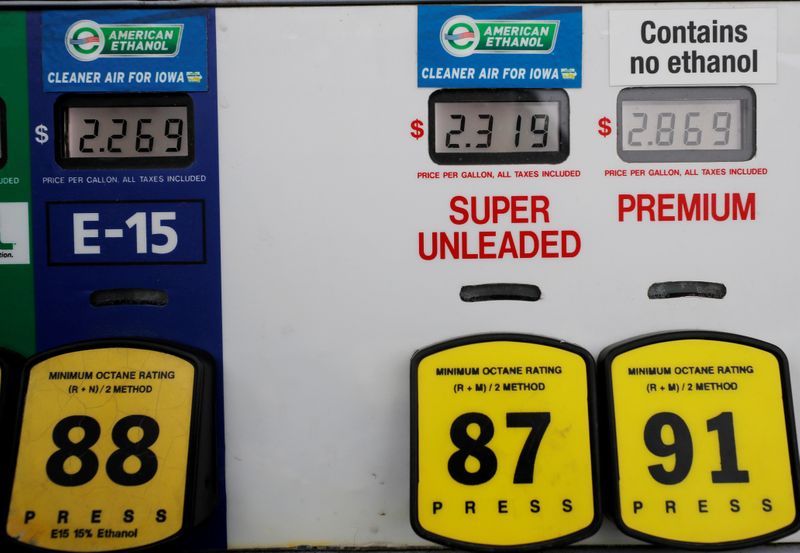By Jarrett Renshaw
(Reuters) - Billions of dollars in federal investments and tax credits to boost demand for U.S. biofuels will be part of two bills that Democratic lawmakers will introduce to the U.S. Congress, two sources familiar with the plans said.
Congress members from rural states will introduce bills in coming weeks seeking federal funds to add more high-biofuel blend pumps at retail stations and tax credits for automakers that put more "flex-fuel" vehicles on the road.
President Joe Biden was expected to give an update on Monday on whether the White House will accept a pared-down infrastructure bill negotiated by bipartisan group of lawmakers. If that happens, the sources said, the biofuels bills could be rolled into a massive spending bill with economic priorities Biden omitted from the infrastructure talks. Democrats and the White House hope the spending bill will pass along party lines this fall in a process called reconciliation.
The biofuels industry, including Archer Daniels Midland (NYSE:ADM) and Renewable Energy Group (NASDAQ:REGI) among others, is under pressure as the administration mulls cutting biofuel mandates to help U.S. oil refiners deal with rising regulatory costs.
Farm Belt Democrats including Senator Amy Klobuchar of Minnesota and Representatives Cheri Bustos of Illinois and Cindy Axne of Iowa are leading the charge to support biofuels, sources said. These lawmakers often chide their party for paying too little attention to rural communities.
The lawmakers plan to seek $2 billion in funding to pay for new fuel pumps and other infrastructure for providing higher biofuel blends like ethanol and biodiesel. They are seeking a 5-cent-per-gallon tax credit for gas stations offering so-called E15, which is gasoline that contains 15% ethanol.
They also are seeking a $200 per car tax credit for automakers that make "flex fuel" vehicles that can run on virtually any blend of gasoline or ethanol.
Slim majorities in the House and Senate will embolden Democratic lawmakers to fight for pet projects and regional demands, in exchange for supporting the major spending plan. Congressional aides and White House officials have warned that those regional and special interests could swell the spending bill and complicate efforts to move ahead on a party-line vote.
BIDEN'S COMPETING PRIORITIES
While farm states want the White House to help the biofuels industry, labor groups and another group of Democratic senators have a competing demand for helping lower costs for refiners. The U.S. Renewable Fuel Standard requires refiners to blend biofuels like ethanol into fuel or buy tradable credits from competitors who do.
The U.S Environmental Protection Agency is weighing a nationwide general waiver exempting U.S. refiners from some obligations. This would lower the amount of renewable fuel refiners must blend in the future and create a price cap on compliance credits.
Another priority for Biden has been boosting electric vehicles. He included $174 billion to pay for charging stations in his 'American Jobs Plan' introduced in March.
Electric vehicles are key to Biden's drive to get the United States to net-zero carbon emissions by 2050. Environmental groups may see biofuel investments as counter to those goals.

"Investments into our electric vehicle system are necessary and good, but liquid fuel is not going to disappear overnight," Bustos told Reuters. She acknowledged her support for the biofuels market but did not share any bill details.
"The way we look at is biofuels have the potential to drive down our carbon emissions now, not 10 years from now, not by 2050, but right now," Bustos said.
